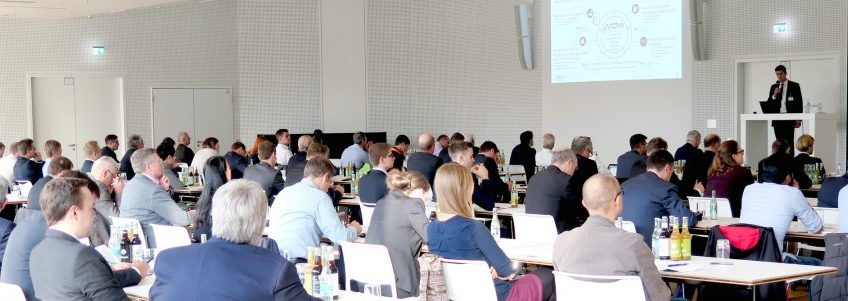In 2017 turnover for German freight logistics alone was 263 billion euros and is currently ranked third on the list of all economic sectors, after trade and the automotive industry. Since fuel cells have already have a steadily growing market share in logistics applications in North America, the technology in Germany and the rest of the EU will be noticeably used more intensively. The sector network Clean Intralogistics Net (CIN), in cooperation with four partners, therefore organised on 6 November 2018 a free workshop specifically on using fuel cells for industrial trucks in the House of Logistics and Mobility (HOLM) at Frankfurt airport.
Under the heading “Economic and Environmental Benefits with Hydrogen and Fuel Cells in Material Handling and Intralogistics”, operators from various sectors informed national and international specialists and management from the logistics, intralogistics, vehicle fleets, warehouse and procurement sectors about the status quo in fuel cell technology.
First and foremost, awareness and information took centre stage: How advanced is fuel cell technology in intralogistics in Europe? How is it specifically used in logistics? What specific funding is available in the EU, particularly in Germany? “Our common goal is to continue to establish fuel cell technology in Germany and Europe. Given the uncertain future of diesel technology, fuel cells can make a decisive contribution to climate protection. Using industrial trucks with fuel cell technology in logistics, CO2 emissions can be decreased by at least 25 per cent while at the same time increasing productivity and reducing storage space and loading time”, says Wolfgang Axthammer, Managing Director and Divisional Head, Special Markets at NOW GmbH, the initiator of the workshop. “In North America, warehouses and production plants are already managed with fuel cell-operated industrial trucks. In Germany and the EU, interest in fuel cell technology in the logistics area is growing steadily.”
Clean Intralogistics Net (CIN) hosted the workshop in cooperation with four partners. The Fuel Cells and Hydrogen Joint Undertaking (FCH JU), a public-private partnership between the EU Commission, industry and research, grants funding from the EU initiative Horizon 2020 to research and development projects in the area of hydrogen and fuel cells. It has set itself the objective of accelerating the development and application of hydrogen and fuel cells in Europe.
NOW GmbH coordinates and manages the federal government’s National Innovation Programme for Hydrogen and Fuel Cell Technology (NIP). The organisation focusses on sustainability with the overarching goal of climate protection.
The Hydrogen and Fuel Cell Initiative in the state of Hesse is a competence network of universities, companies and other actors in Hesse, serving as a key contact partner and advisor on issues relating to hydrogen and fuel cell technology.
About Clean Intralogistics Net (CIN)
Clean Intralogistics Net was established in 2016 in order to sustainably accelerate the use of fuel cell technology. NOW GmbH National Organisation Hydrogen and Fuel Cell Technology is the initiator of the network. Today there are 13 globally operating companies partnered in CIN. For more information: www.cleanintralogistics.net


